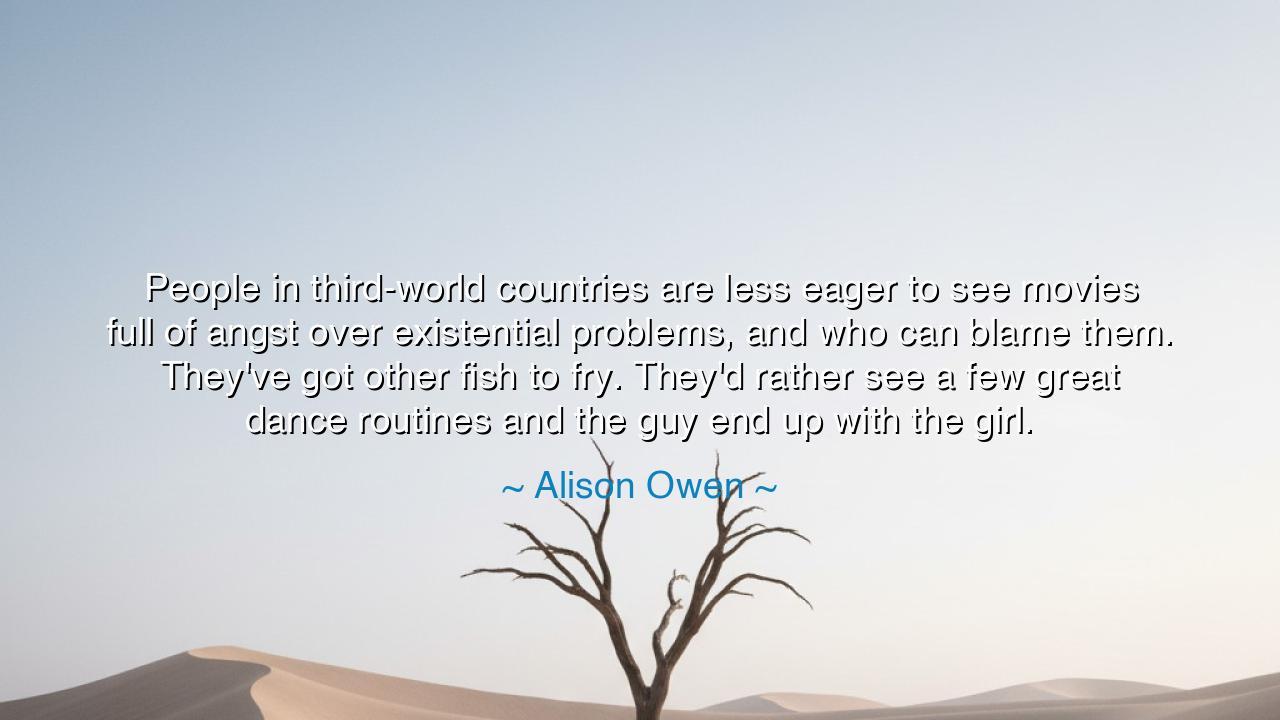
People in third-world countries are less eager to see movies
People in third-world countries are less eager to see movies full of angst over existential problems, and who can blame them. They've got other fish to fry. They'd rather see a few great dance routines and the guy end up with the girl.






In the world’s grand tapestry, where life weaves countless stories, the essence of each journey is shaped not only by the individual, but by the circumstances in which one lives. Alison Owen, in her reflection on the nature of cinema and the human experience, speaks a profound truth: "People in third-world countries are less eager to see movies full of angst over existential problems, and who can blame them. They've got other fish to fry. They'd rather see a few great dance routines and the guy end up with the girl." These words are a testament to the universality of human needs, a reminder that while some ponder the complexities of the soul, others are preoccupied with the daily struggles of survival.
In the third-world lands, where the pressures of poverty, strife, and survival shape the contours of existence, existential dilemmas may seem a distant luxury, a concept too abstract for the weight of daily life. For those whose lives are marked by the struggle for food, shelter, and security, the profound questions of existence often fall to the side. The hunger for meaning may not be satisfied by films that delve into the angst of the human condition, but by those that offer escape—a reprieve from the burdens of reality, even if only for a fleeting moment. Owen’s words echo the truth of human nature: when life itself is a battle, the mind craves not the complexities of philosophy, but the simplicity of joy, dance, and love.
Consider the ancient world, where the mighty pharaohs ruled Egypt and the spartan warriors of Greece fought with valor. Their lives were not filled with idle reflection on the meaning of life, but with the duty to their lands and families. In Egypt, grand celebrations were held not just for the gods, but for the people—a release from the hardships they faced. In Sparta, young warriors trained not to question the fate of their battles, but to fight with strength and honor. Even in their epic tales, from the heroic adventures of Homer’s Iliad to the grand spectacles of Roman gladiators, there was little room for existential questioning. The people sought not to ponder the nature of existence, but to experience life in its fullest expression—through action, victory, and triumph.
The same spirit lives today in the people of the third-world, whose struggles may not be those of grand philosophical debates, but of the everyday battles of life. A good dance routine, a story where the hero wins, and the couple finds love—these are the simple desires that speak to the human soul, for they offer not just entertainment, but a momentary escape from the harshness of existence. In the face of daily challenges, these films remind people that there is still joy in the world, still a chance for happiness, even if that happiness is not found in existential pondering, but in simple pleasures. It is not the meaning of life that they seek, but the joy of living in the midst of their struggles.
Even in the Western world, where the luxury of reflection is more common, there has always been a pull toward entertainment that offers a reprieve from the burdens of existence. Shakespeare, though deeply philosophical in his plays, also knew the value of laughter, of love, and of triumph over adversity. The comedies of Shakespeare were not mere distractions but were reflections of the human need to find joy, even in hardship. Twelfth Night, A Midsummer Night’s Dream, and Much Ado About Nothing offered not only wit and cleverness but moments of escape, where the complexities of the world were swept away by laughter, music, and romance.
And so, the lesson we must take from Owen’s words is one of balance. There is a time for deep reflection, for contemplating the existential questions of life, and there is a time for escape, for embracing the simple joys that make us feel alive. Humanity needs both—the moments of serious contemplation that allow us to understand the world’s deeper meanings, and the moments of levity and joy that remind us of the beauty in living. Just as the ancient cultures balanced the tragic with the joyful, so too must we. Life is not just about grappling with its hardships; it is about finding moments to celebrate, to dance, to love, and to remember that even in the face of struggle, there is joy to be had.
As you walk your path, remember this: life is not a single note, but a symphony that requires both the highs and the lows, the deep reflections and the light-hearted escapes. Do not discount the importance of joy in the pursuit of meaning. Whether you are in a land of hardship or a land of luxury, remember that both the philosopher and the dancer seek the same thing—to feel alive, to be connected to the world, and to find meaning, not only in deep reflection but in the simple pleasures that bind us all together. So, dance when you can, love when you can, and never forget that in the simplest moments, the most profound truths may be found.






AAdministratorAdministrator
Welcome, honored guests. Please leave a comment, we will respond soon